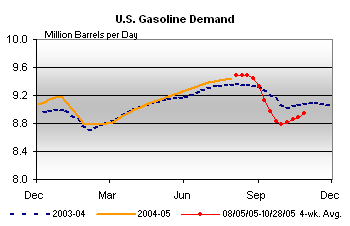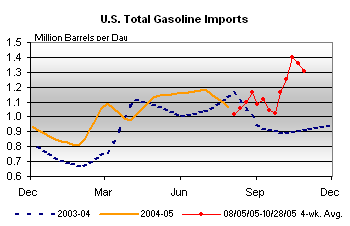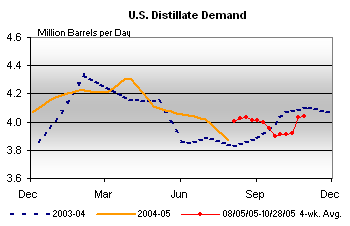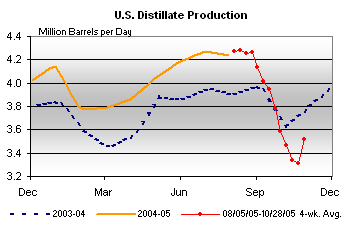In the beginning of the fourth quarter
Posted by Heading Out on November 3, 2005 - 1:07am
Although the four-week averages of the gasoline demand show that demand is still approaching last year's, the weekly number has now passed 9 mbd, above last year.
 However, as the import numbers suggest, taking individual weekly data by itself can be a mistake, since over the past week imports have turned back up by 200,000 bd after dipping down, and so are still that half-a-million above normal.
However, as the import numbers suggest, taking individual weekly data by itself can be a mistake, since over the past week imports have turned back up by 200,000 bd after dipping down, and so are still that half-a-million above normal.
 . At present the volume in stocks seems to remain fairly steady at the average of the past few years volume.
. At present the volume in stocks seems to remain fairly steady at the average of the past few years volume.
 and with production beginning to rise
and with production beginning to rise
 so that it is now about the same as last year, as is the current level of imports and stocks are a little ahead of last year.
so that it is now about the same as last year, as is the current level of imports and stocks are a little ahead of last year.
So this week's news is perhaps at first that there isn't any. However, Platts reports that DoE is anticipating stronger imports from Asia.
The US Department of Energy expects there to be strong imports into the country this coming winter from around the world, but most notably from Asia, Deputy Assistant Secretary Mark Maddox told a House panel Wednesday.Given that Platts is also quoting Exxon Mobil that the Chalmette refinery is initiating start-up procedures which is ahead of the quoted start-up that we had a reference to yesterday, at present the news would appear to be good.In prepared remarks for presentation to the Energy and Commerce Committee, Maddox noted that, "based on our conversation with industry, we expect that distillates will continue to enter into the US from all over the world, but especially from Asia."




IMO this winter oils price is going to depend on how cold and how long it lasts. If it doesent spike this year there is always next.
(If it's cold in the U.K., they may go to three day workweeks.)
http://www.fcnp.com/534/peakoil.htm
(I hadn't thought about it, but because of the hurricanes, the U.S. is currently getting 80% of its oil supply from imports and the SPR.)
Diesel fuel costs vs. Gasoline.
My simple warped mind sees the transpo trucking costs
increases ....explained falsely as inflationary to
general public (consumer is paying). And the lower
personal vehicle (your car)fuel falling....so as to
insure employment.I'm so happy!!!
or in perhaps a more direct way of expressing
my thought...
Stuff at Wal-mart is going up (diesel)
I pay more so profit margins can (in theory?) exist.
I bitch, am pinched, lower gasoline (relief) I can
still afford to go to work, retain a baby sitter,
start buying 40 watt bulbs...and a case of suds.
Now everyone is happy.
Retailer, consumer and the man behind the curtain.
WHAT AN EXPERIMENT ?
Techno answers please,
refineries, demand destruction etc terrrra...
import availability...
I suspect a clever manipulation. So evil.
Curiously after hurricane RITA and the additional
losses of the infrastructure prices barely spiked
budged ...noda...in fact embarked a steady fall.
VERY CURIOUS.
You see here in my neck of the woods this I observed
Southern Michigan,
Explain ...
Please,
commodity markets ??? Ha,
Silver manipulation ???
Can I say THIN ?
A fiat system controlled by a few .
I gotta stop now.
My beak is getting tired
I've pecked long enough.
Think small, think fast, peace
Male pattern baldness = which hand I use
to scratch my head !
The common explanation of diesel prices rising more compared to gas is that while you can cut one trip or buy a Prius when gas rises, a truck driver can not say "LOL diesel is expansive today, I will not drive to that KMart I'll take the bus instead".
There is a reason for everything, be it Adam Smith, John Smith or Smitty Smith.
And I know that my official sh@t sandwich is plotted
on a chart using officialy charted sh@t.
And the 64 k ? who sets [prices] .
I do by trading the futures market?
I don't believe it.
18 billion $'s worth of contracts maybe.
Who's got that little bit of scratch.
The same fella gettin da Bird flu medicine for ya?
yikes.
lol is that lots of luck?
Once again the weekly charts show that for the last week, demand was higher last week than a year ago. I know that everyone always says that one should look at the four week average, but the weekly data is still talking a great deal. What it is saying loud and clear (to me) is that the concept of demand destruction is fictitious. Prices during this whole period have apparently not affectyed demand except for the specific week or two of the huricanes.
Also, being a conspiracy theorist, I note that on the multi-line chart showing demand that the information for last year is not shown (either weekly data or the 4 week average). I believe that this ommission is deceptive and probably intentionally so.
Nor can I believe that world wide demand is very much different from last year.
Considering that GOM crude production is still substantially shut in, and demand numbers being unchanged from last year, there is something that does not add up unless the withdrawals from the Strategic Reserve is being used to inflate the numbers. Is the administration now just giving this crude to their cronies or is there really a lien on behalf of the people of the US against future production?
Despite all of this, why is gasoline prices well below the cost before the huricanes? Is this irrational exuberance or just manipulation to prevent the imposition of windfall profit taxes?
http://tonto.eia.doe.gov/dnav/pet/hist/wrpupus24.htm
is different from the 4 week product supplied average here
http://www.eia.doe.gov/pub/oil_gas/petroleum/data_publications/weekly_petroleum_status_report/curren t/txt/wpsr.txt
I think this is very important because one shows demand running 2% above last year and the other shows it running 1.7% below last year.
The second one says "Total product supplied over the last four-week period has averaged nearly 20.5 million barrels per day."
Sounds about the same to me.
I agree, very weird, have to tried e-mailing them?
From their contact page:
Weekly Petroleum Status Report Larry Alverson 202-586-9664 larry.alverson@eia.doe.gov
If you don't want to, I will, you've peaked my curiosity.
I will email them and let you know what they say.
Thanks again.